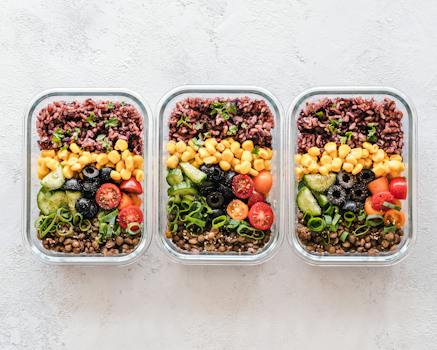
Having healthy digestive processes is crucial to living a long and happy life. Clean eating, or the consumption of natural, unadulterated foods without additives or preservatives, has been shown to improve digestive health. A healthy digestive system can be supported by eating a diet high in certain nutrients and avoiding others. Here, we’ll look at a few easy ways to promote better digestion through dietary changes.
- 1. Introduction
- 1.1. What is clean eating?
- 1.2. Importance of clean eating for digestion
- 1.3. Benefits of clean eating
- 2. Foods to Include in a Clean Eating Diet
- 2.1. Fresh fruits and vegetables
- 2.2. Whole grains
- 2.3. Lean proteins
- 2.4. Healthy fats
- 2.5. Probiotic-rich foods
- 3. Foods to Avoid in a Clean Eating Diet
1. Introduction
Consuming foods in their purest, most unaltered forms is at the heart of the “clean eating” movement. Your health and well-being can greatly benefit by ditching processed and artificial foods. The beneficial effects on digestion are one of the main reasons why clean eating is so beneficial. Eating clean supports a healthy digestive system by giving your body the fuel it needs to perform at its best. Here, we’ll look at some easy ways to promote healthy digestion through diet.
1.1. What is clean eating?
The term “clean eating” refers to a way of eating that emphasizes the consumption of natural, unprocessed foods while eschewing their refined and processed counterparts. Choose fresh, organic fruits and vegetables, lean proteins, and healthy fats, as these are highlighted. Eating clean also means cutting back or cutting out processed foods, which can include things like added sugars, artificial substances, and preservatives. In order to maintain optimal health, clean eaters focus on consuming meals that are high in nutrients. One’s digestion, one’s vitality, and one’s quality of life can all benefit from adopting a clean eating habit.
1.2. Importance of clean eating for digestion
Eating clean is essential for a functioning digestive system. Digestion and intestinal health can be enhanced by prioritizing the consumption of complete, unprocessed meals. Processed foods are common in the modern diet, and they often contain a lot of refined sugars, harmful fats, and artificial ingredients. These components have been linked to digestive disorders like bloating, gas, and constipation by disrupting the gut’s normal bacterial balance.
When you eat clean, you focus on picking out foods that are high in beneficial compounds like vitamins, minerals, fiber, and antioxidants. These foods encourage the development of good bacteria in the digestive tract, which improves nutritional absorption. The elimination of waste and toxins from the digestive tract is another benefit of a clean eating lifestyle.
Inflammation in the digestive tract can be decreased by consuming a clean diet. Conditions like leaky gut syndrome can be brought on by the irritation of the intestinal lining caused by the pro-inflammatory chemicals found in many processed foods. Reducing intestinal inflammation and maintaining a healthy gut lining can be accomplished by avoiding these toxic compounds and instead eating full, natural meals.
In conclusion, eating healthily is crucial for digestive health. Optimizing gut health, decreasing digestive difficulties, and boosting general well-being can be achieved through the deliberate consumption of unprocessed, nutrient-dense meals.
1.3. Benefits of clean eating
The many health advantages of a clean diet have led to its rising popularity in recent years. A person’s digestion and health as a whole can benefit from a switch to a clean eating habit. The advantages of clean eating will be discussed, as well as some easy ways to start implementing it into your daily life.
2. Foods to Include in a Clean Eating Diet
Clean eating is all about improving digestion, so it’s important to make sure you’re eating the correct things. Eating clean means ingesting foods in their natural, unaltered state, which are high in nutrients and lack any added preservatives or sugars. To keep your digestive system happy and healthy, try incorporating these foods into your clean eating plan.
Fruits and vegetables high in fiber help to maintain a healthy digestive system and intestinal tract. Berries, greens, broccoli, and avocados are just a few examples.
Second, choose whole grains high in fiber, such quinoa, brown rice, and oats, to aid in the maintenance of regular bowel movements.
Chicken, turkey, fish, and tofu are all excellent options for lean protein that won’t derail your clean eating plan. These proteins supply vital amino acids while also being easy to digest.
Nuts, seeds, olive oil, and avocados are all great examples of healthy fats that should be incorporated into your diet. Fats like this ease digestion and aid in absorbing nutrients.
Probiotics found in yogurt, sauerkraut, and kimchi all contribute to a balanced microbiome in the gut. Probiotics are beneficial because they assist digestion and boost immunity.
Clean eating can help with digestion, intestinal health, and overall well-being by consuming these items.
2.1. Fresh fruits and vegetables
Fruits and vegetables, especially fresh ones, are crucial to a healthy diet. They are beneficial to your health and digestion because they are full of vitamins, minerals, and antioxidants. Eating a wide variety of fresh fruits and vegetables every day can aid in detoxification, increase energy, and promote good digestion. Berries, citrus fruits, apples, and bananas are some of the most nutritious options. The high fiber content of these fruits is beneficial for digestive health and the avoidance of constipation. You can’t go wrong with greens, broccoli, carrots, and bell peppers, either. They help promote digestive health and supply vital nutrients. You can improve your digestion and health in general by increasing your consumption of fresh fruits and vegetables as part of your clean eating plan.
2.2. Whole grains
Achieving success in every area of life, including mental health and well-being, requires setting quantifiable goals. Goals should be set in accordance with the SMART criterion. Specific, Measurable, Achievable, Relevant, and Time-bound are the five tenets of a SMART goal.
When setting objectives, it’s important to be as detailed as possible. A more actionable aim would be to do something concrete like “practice mindfulness meditation for 15 minutes every day” rather than something more general like “improve my mental health.” This will give you something concrete to strive for as you work.
The next factor is quantifiability. Goals that can’t be measured or tallied aren’t very useful. When you have clear, quantifiable objectives, you can track your progress and make course corrections as needed. You may tell yourself something like, “I want to cut down on my anxiety symptoms by 20 percent in the next three months.” In this approach, you can keep tabs on your anxiety levels over time and see how much you’ve improved.
When creating objectives, it’s also crucial to consider how realistic they are. Make sure that your objectives are reasonable and doable. The mental health risks associated with setting objectives that are impossible to achieve are well-documented. Setting goals that are both difficult and achievable is crucial. Running a marathon in a month may be an ambitious ambition for someone who has never worked out before. A more reasonable and doable beginning point could be to walk for 30 minutes three times a week.
Making sure your objectives serve your values, interests, and well-being is what we mean by “being relevant.” It’s important to set goals that matter to you and help improve your emotional and psychological wellness. Setting a goal to spend more time doing creative things, for instance, can be meaningful and satisfying if you place a premium on originality.
Last but not least, time-bound objectives are those that have a deadline. Having a certain date in mind to achieve one’s objectives helps to instill a sense of urgency and boosts motivation. It’s useful for reducing large projects to more manageable chunks. Goals that are not time-bound are less likely to be achieved, so instead of saying, “I want to improve my mental health,” try something more specific, such, “I want to practice deep breathing exercises for five minutes every morning for the next two weeks.” You’ll be able to track your progress within the confines of a defined time range.
In conclusion, it is essential to define SMART goals for mental health and welfare in order to monitor development and attain success. The best way to track progress, maintain motivation, and boost emotional and mental health is to set goals that are SMART (specific, measurable, achievable, relevant, and time-bound).
2.3. Lean proteins
One of the cornerstones of a healthy diet is lean proteins. They help you feel full longer and give you the building blocks for muscle development and repair. Lean proteins aid with digestion because they keep blood sugar levels steady and encourage a healthy metabolism.
Skinless chicken and turkey breast, fish (such salmon, tuna, or cod), tofu, tempeh, and Greek yogurt are all good sources of lean protein to incorporate into a clean eating plan. These alternatives are great for those who are trying to stick to a healthy diet because they are low in saturated fat and high in nutrients.
It is essential to use cooking methods that preserve the nutritional content of lean proteins while preparing them. If you want to keep the health advantages of these foods, the best ways to cook them are by grilling, baking, steaming, or sautéing with minimum oil.
Lean proteins are a great addition to a clean eating diet because they aid in digestion and contribute to better health.
2.4. Healthy fats
Including some healthy fats in your clean eating plan can do wonders for your digestion and well-being. These fats are crucial because they fuel the body, promote healthy cell division, and facilitate the absorption of vitamins. Some good fats to incorporate into your clean eating plan are listed below.
To lower LDL (“bad”) cholesterol levels, consume more avocados, which are rich in monounsaturated fats. They are a great source of fiber and several essential nutrients.
Nuts and seeds are a great way to get healthy fats into your diet; some examples include almonds, walnuts, chia seeds, flaxseeds, and hemp seeds. They help keep inflammation at bay and promote brain health thanks to their abundance of omega-3 fatty acids.
Olive oil has many beneficial properties and is a mainstay of the Mediterranean diet for good reason. It has a high concentration of anti-inflammatory monounsaturated fats and heart-healthy antioxidants.
Among the fatty fish, salmon, mackerel, trout, and sardines are particularly rich sources of the omega-3 fatty acid omega-3. These fats have been shown to lower cholesterol, boost brain power, and promote general health.
You may improve your digestion, vitamin absorption, and general health by include these healthy fats in your clean eating diet.
2.5. Probiotic-rich foods
In order to keep yourself motivated and focused, it’s important to set goals that have a deadline. A sense of urgency and additional motivation to get things done is created by setting deadlines for ourselves. Goals with deadlines help us stay focused and make the most of our time. We can track our progress and stay on track by dividing our major goals into smaller, doable activities with defined dates. Having a schedule also helps us prioritize our work and make the most of our available resources. Setting objectives that have a deadline helps us maintain our mental and emotional health and well-being because it gives us a feeling of purpose and a path to follow.
3. Foods to Avoid in a Clean Eating Diet
Some foods are best avoided on a clean eating diet in order to facilitate better digestion. These foods may interfere with digestion and nutrient absorption, resulting to bloating, gas, and other unpleasant symptoms. Some frequent foods to avoid when following a clean eating plan are listed below.
Artificial chemicals, preservatives, and added sugars are commonplace in processed foods. These chemicals have been linked to gastrointestinal irritation and disruption of the digestive process. Whole, unprocessed foods are preferable.
Drinks High in Added Sugars and Low in Nutritional Value Soda, fruit juices, and sports drinks are examples of sugary drinks. Constipation, excess gas, and other digestive issues have all been linked to eating too much sugar. Avoid sugary drinks and go for water instead.
Thirdly, fried foods, such as french fries, fried chicken, and deep-fried snacks, are notorious for their high levels of harmful fats and their potential to wreak havoc on your digestive system. Consuming these foods may lead to bloating, gas, and other digestive issues. Instead, try baking, grilling, or steaming your food.
Artificial sweeteners, which can be present in many processed foods and diet drinks, have been linked to a disruption in the gut microbiome and a subsequent increase in gastrointestinal symptoms. Natural sweeteners, such as honey or maple syrup, should be used sparingly.
5. Dairy Products: Some people, especially those who are lactose intolerant or have a sensitivity to dairy, have trouble digesting dairy products including milk, cheese, and ice cream. Bloating, flatulence, and digestive distress may result from using these items. Almond milk and coconut milk are two examples of dairy replacements.
Supporting digestive health and improving general wellbeing, a clean eating diet requires avoiding certain foods.
3.1. Processed foods
In a healthy eating plan, processed foods are off limits. These foods typically contain a lot of sugar, bad fats, and artificial ingredients. They are not nutritionally sound and may cause gastrointestinal distress.
The natural fiber that is vital to a healthy digestive system is often removed during the processing of many processed meals. Cereals high in sugar, packaged snacks, fast food, soda, and ready-to-eat meals are all examples of processed foods to avoid.
Focus on eating complete, unprocessed foods that are high in nutrients rather than relying on processed foods. Fruits, vegetables, whole grains, lean meats, and healthy fats all fall under this category. You can improve your digestion and general health by eating these foods.
The digestive system can benefit greatly from adopting clean eating practices including avoiding processed meals.
3.2. Refined sugars and carbohydrates
In a diet focused on clean eating, refined sugars and carbs are to be avoided at all costs. There is very little nourishment left in these highly processed substances, and they can wreak havoc on your digestive system. White sugar and high-fructose corn syrup are two examples of refined sugars that are frequently added to processed goods for flavoring. However, excessive consumption of refined sugars has been linked to weight gain, inflammation, and an increased risk of chronic diseases such as diabetes and cardiovascular disease.
Similarly, processing removes fiber and minerals from refined carbs like white flour, white rice, and refined grains. These calories have little nutritional value and have been linked to digestive problems like bloating and constipation as well as rises in blood sugar.
Avoiding processed sugars and carbohydrates is a cornerstone of the clean eating philosophy. Eat more fruits, veggies, lean meats, and whole grains instead of processed foods. If you want better digestion, to keep your weight in check, and to feel healthier overall, reduce or eliminate your consumption of processed sugars and carbohydrates.
3.3. Artificial additives and preservatives
To improve their taste, texture, color, and longevity, many food manufacturers use artificial additives and preservatives. However, these additives are best avoided on a clean eating diet as they have been related to a variety of health problems.
Artificial additives and preservatives are common in processed foods including packaged snacks, drinks, and frozen dinners. These compounds have questionable health effects and contribute almost little to one’s diet.
Artificial sweeteners like aspartame and sucralose, which can be found in diet sodas and sugar-free snacks, are two examples of artificial additives and preservatives to be wary of. These sugar substitutes can upset the delicate balance of intestinal bacteria, which can lead to bloating and other digestive issues.
Monosodium glutamate (MSG), a flavor enhancer frequently used in processed foods, is another addition to avoid. Some people who consume MSG report experiencing headaches, bloating, and other gastrointestinal distress.
In addition to artificial food colors and high fructose corn syrup, other artificial additives and preservatives have also been related to gastrointestinal problems and may lead to systemic inflammation.
A clean eating diet emphasizes the consumption of entire, unprocessed foods as a means of improving digestion and general well-being. Fresh produce, lean meats, nutritious grains, and natural sweeteners like honey and maple syrup are all good examples of what to eat to achieve this.
Support your digestive system and reap the benefits of clean eating by avoiding foods that include artificial additives and preservatives.
3.4. Trans fats
Avoiding trans fats is a crucial part of maintaining a healthy diet. Hydrogenation is a manmade technique used to transform oils into solid fats like these. Fried foods, baked products, and margarine are common examples of processed foods that include trans fats. They contribute to inflammation, poor cholesterol levels, and an increased risk of heart disease. Food labels should be examined thoroughly, and items containing trans fats or partially hydrogenated oils should be avoided. Olive oil, avocado oil, and coconut oil are better options because they are high in monounsaturated and polyunsaturated fats, which aid in digestion and overall health.
3.5. Excessive caffeine and alcohol
Two drugs that should be avoided in large quantities on a clean eating diet are caffeine and alcohol. Caffeine may give you a short burst of energy, but too much of it can have serious consequences for your gastrointestinal system. Caffeine is a stimulant that, since it irritates the stomach lining, can cause heartburn and other digestive issues. As a diuretic, it can lead to dehydration and may interfere with the body’s normal detoxification mechanisms.
However, alcohol consumption is associated with digestive and health problems. It may cause inflammation and gastrointestinal distress by irritating the stomach lining. The delicate balance of gut bacteria, which aids digestion and nutrition absorption, can be upset by excessive alcohol consumption.
Drinks that aid digestion should be given high priority when following a clean eating plan. If you need a pick-me-up, try some herbal tea or flavored water instead of coffee. Consuming alcoholic beverages in moderation is recommended. Reduce your consumption and replace unhealthy drinks with healthier alternatives like red wine.
When following a clean eating plan, eliminating excessive caffeine and alcohol might help with digestion and enhance general health.
Conclusion
Changing to a more healthful diet can do wonders for your digestion. A healthy gut and improved nutrient absorption are both possible outcomes of a diet that places an emphasis on whole, unprocessed foods and minimizes the use of chemicals and preservatives. Maintaining an adequate water intake, eating consciously, and controlling stress all contribute to better digestion. If you want to improve your digestive health through clean eating, start using these easy strategies right away.


